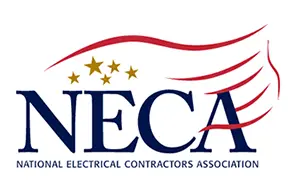NECA: National Electrical Contractors Association

NECA, the National Electrical Contractors Association, is the voice of the $130 billion industry responsible for bringing electrical power, lighting, and communications to buildings and communities across the United States. Established in 1901, the organization is dedicated to serving the management interests of the entire electrical contracting industry. NECA represents electrical contractors from firms of all sizes performing a range of services. While most NECA contractors qualify as small businesses, many large, multinational companies are also members of the association. Standards from NECA are available both individually, directly through the ANSI webstore, and as part of a Standards Subscription. If you or your organization are interested in easy, managed, online access to standards that can be shared, a Standards Subscription may be what you need - please contact us at: [email protected] or 1-212-642-4980 or Request Proposal Price.
Below are NECA's best-selling standards. To find additional standards, please use the search bar above.
NECA 1-2015
Standard for Good Workmanship in Electrical Construction (ANSI)
Describes industry best practices for good workmanship in electrical construction.
NECA/NEMA 600-2014
Standard for Installing and Maintaining Medium-Voltage Cable (ANSI)
This standard describes installation procedures for shielded and non-shielded solid-dielectric medium-voltage cables rated from 2001 Volts to 35,000 Volts AC and installed in conduits or ducts, or direct-buried. This publication applies to single-and multi-conductor cables used for distributing power for commercial, institutional, and industrial loads in nonhazardous locations both indoors and outdoors.
NECA/NEMA 105-2015
Standard for Installing Metal Cable Tray Systems (ANSI)
Describes installation practices and procedures for metal cable tray systems. Details about maintenance, system modification, grounding and bonding, and inspection and addition of cables are complemented by illustrations throughout. A full list of reference standards is also included.
NECA 100-2013
Symbols for Electrical Construction Drawings (ANSI)
This publication describes graphic symbols used to represent electrical wiring and equipment on construction drawings. In this publication, the term ôelectricalö is used to include electrical, electronic, and communications systems covered by the National Electrical Code (NFPA 70). This publication also summarizes recommended drawing practices for electrical construction drawings.
The PDF version of NECA 100 includes:A link containing a .zip file with the NECA 100 AutoCad Symbol files can be downloaded from the Table of Contents. NOTE: It's a zip file, so it will immediately initiate a download. - See more at: http://apps.necanet.org/store/products/index.cfm/NECA%20100%2D13#sthash.AksRr1OQ.dpuf
NECA/BICSI 607-2011
Standard for Telecommunications Bonding and Grounding Planning and Installation Methods for Commercial Buildings
This American National Standard specifies aspects of planning and installation of telecommunications bonding and grounding systems within a commercial building. This standard is intended to enhance the planning, specification and layout of an effective telecommunications bonding and grounding system. Additionally, this standard specifies installation requirements for components of the telecommunications bonding and grounding system.
NECA 101-2013
Standard for Installing Steel Conduit (Rigid, IMC, EMT) (ANSI)
Describes installation practices for rigid metal conduit (RMC), intermediate metal conduit (IMC), electrical metallic tubing (EMT), and steel conduit with supplementary PVC coating. Includes guidelines for conduit bending and threading. Developed jointly with the Steel Tube Institute of North America (STI), NECA 101 is approved as an American National Standard (ANS).
NECA 200-2016
Recommended Practice for Installing and Maintaining Temporary Electric Power at Construction Sites (ANSI)
Describes installation procedures for temporary power at construction sites. It covers the planning, installation, expansion, maintenance, cutover, and removal of temporary power systems operating at 600 volts or less. NECA 200 is approved as an American National Standard (ANS).
NECA 400-2007
Standard for Installing and Maintaining Switchboards
This Standard describes installation procedures for deadfront distribution switchboards rated 600 volts or less.
NECA 408-2015
Standard for Installing and Maintaining Busways (ANSI)
Describes installation procedures for feeder and plug-in busways and associated accessories rated 600 volts AC or less and 100 amperes or more. It also covers periodic routine maintenance procedures for busways and special procedures used after adverse operating conditions, such as a short-circuit, ground-fault, or immersion in water. NECA 408 is approved as an American National Standard (ANS).
NECA 1-2006
Standard Practices for Good Workmanship in Electrical Construction (ANSI)
This standard describes what is meant by installing equipment in a "neat and workmanlike manner" as required by the National Electrical Code, Section 110.12.





